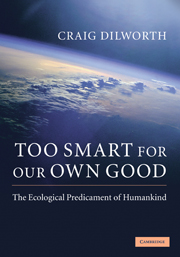Book contents
- Frontmatter
- Contents
- List of figures and tables
- Preface
- Introduction
- 1 Scientific ground rules
- 2 The new views in anthropology, archaeology and economics
- 3 Theoretical background to the vicious circle principle
- 4 The vicious circle principle of the development of humankind
- 5 The development of humankind
- 6 The vicious circle today
- 7 … and too dumb to change
- Conclusion
- Glossary
- Notes
- References
- Index
Introduction
Published online by Cambridge University Press: 25 January 2011
- Frontmatter
- Contents
- List of figures and tables
- Preface
- Introduction
- 1 Scientific ground rules
- 2 The new views in anthropology, archaeology and economics
- 3 Theoretical background to the vicious circle principle
- 4 The vicious circle principle of the development of humankind
- 5 The development of humankind
- 6 The vicious circle today
- 7 … and too dumb to change
- Conclusion
- Glossary
- Notes
- References
- Index
Summary
There is no denying that the world is facing ecological changes that we ourselves have brought about, such as climate change, that are of great detriment to our own species as well as to others. And it must also be admitted that the longer we wait before wholeheartedly dealing with the situation, the worse it will be for us and our children. But where should we concentrate our efforts? What is the appropriate general strategy? To be able to answer these questions, late though they be, we should first consider more closely the nature of our ecologically disruptive behaviour. What exactly does it consist in; and how long has it been going on?
In this book answers are provided to these questions. As regards how long we have been behaving in an ecologically disruptive way, it will be found that we have been doing so as long as we have existed. And, as is suggested by this, what this behaviour consists in is intimately related to our nature as a species. To understand our negative impact on the environment we have to understand ourselves as a species.
For purely intellectual reasons we have since the time of Darwin been in need of an explanation of the development of Homo sapiens as distinct from other species. What has been lacking is a theory in which the causal mechanism behind our development is laid bare.
- Type
- Chapter
- Information
- Too Smart for our Own GoodThe Ecological Predicament of Humankind, pp. 1 - 2Publisher: Cambridge University PressPrint publication year: 2009
- 1
- Cited by

